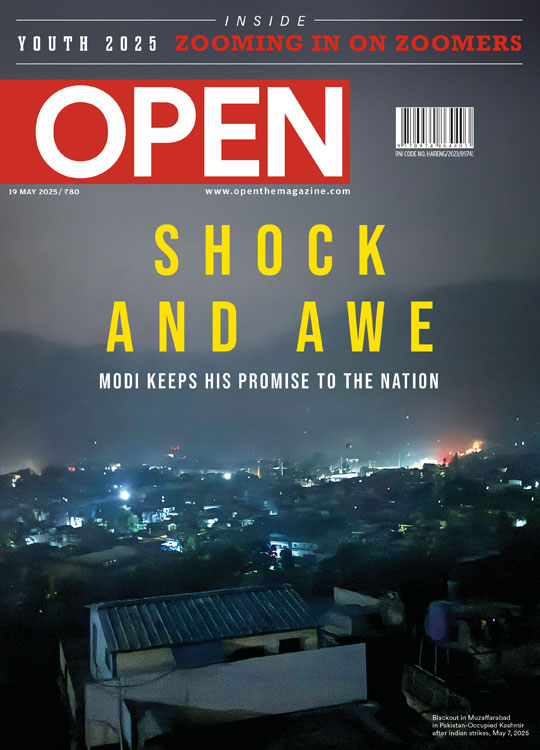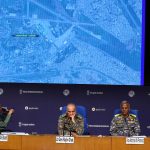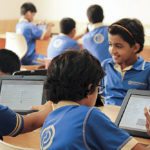The Halal Way to World Peace
He is India’s most voluble Muslim on television today. Just who is Dr Zakir Naik?
 Manju Sara Rajan
Manju Sara Rajan
 Manju Sara Rajan
|
09 Dec, 2009
Manju Sara Rajan
|
09 Dec, 2009
/wp-content/uploads/2015/11/world-peace-1.jpg)
He is India’s most voluble Muslim on television today. Just who is Dr Zakir Naik?
Over 10 days, more than a million people came from all over the country. On 35 acres of prime suburban land in Mumbai, several air-conditioned tents went up. One contained a 12,000 sq ft stage that could have been the backdrop of a Bollywood function: there were high-tech light and sound systems, massive audio-visual screens, and 60 high definition cameras recording the event for live broadcasts. There was a food court, an exhibition arena, even a children’s playground. The audience had every sort of Islamic believer: sisters Mehek and Irfa, who are junior college students; Samajwadi Party MLA Abu Azmi; 23-year-old hospital administrator Nida Sheikh. All brought together by the Peace Conference, a 10-day international Muslim convention, heeding the call of its organiser, Dr Zakir Naik, probably the most powerful Muslim preacher in India today.
If you live in Mumbai, you may have seen pictures of him, or if your cable guy has included Dr Naik’s network Peace TV, you may have seen him speak. Last month when the conference was in progress, there were giant billboards all across the city’s suburban highways, there were advertisements on buses, Muslim drivers had pamphlets on the dashboards of their Meru cabs.
Dr Naik does not cut a striking figure. Tall but reed-thin, always outfitted in a-size-too-large suit with standard issue skullcap and beard, he looks more like a religious professor than a televangelist. His voice still contains the remnants of a childhood stammer and lisp. But through his free-to-air channel Peace TV, massive numbers of books, DVDs, CDs, plus his organisation, the Islamic Research Foundation, its school, and all the charities, Dr Naik has become an unlikely but prominent force among Muslims in the country, perhaps even abroad. “It is very important to be religious and he teaches us things about our religion we didn’t know,” says Nida.
Dr Naik’s base consists of young folks like Nida, urban Muslims, who want a religious context to their everyday lives. They prefer their sermons in English rather than Urdu, and their mullah in a jacket. Dr Naik is most comfortable speaking in English (he believes it is “the language of opportunity”), and unlike the Muslim cleric stereotype, he is a calm orator. By now he’s given so many speeches that he knows all his points by heart, quoting Biblical passages, Quranic verses, even the Oxford dictionary and Encyclopedia Britannica with the timing of a well-practised elocutionist. His topic of expertise: Comparative Religion, wherein he compares Islam with other major world religions. One of his favourite techniques is holding a debate with a spiritual leader of another faith. During a November 2006 debate with Sri Sri Ravishankar, founder of the Art of Living, Dr Naik pointed out several inconsistencies in Sri Sri’s book, Hinduism and Islam: The Common Thread. Sri Sri admitted that the book was hastily written and so erroneous that he never printed it a second time. See the intent behind the book, not the details, he pleaded, “See the good in all religions, converting from one to another is not going to solve the problem. You don’t have to be Danish to eat Danish cookies.”
Dr Naik’s followers see him as an intellectual who can prove the superiority of Islam by comparing it to other religions. “My main aim is to come to common terms with others. If we read religious scriptures, all religions believe in only one God, idol worship is not allowed. Unfortunately, people don’t read the scriptures, they follow religious teachers who always have an agenda,” says Dr Naik. But he is not absolutely clear about his own agenda. In his speeches, he says that all religions began with a fundamental belief that there is only one true God, but he doesn’t spell out what he wants from non-Muslims once they agree on the concept of a single Almighty. “I don’t want to convert people, the right word is revert. Every human being was born to submit to the will of God, scientific research proved that. Look at the Kapauku tribe,” he says, referring to the Kapauku Pappuans, an aboriginal tribe that lives along the coast of Papua New Guinea. Even before they came into contact with the civilised world, they had evolved seemingly sophisticated ideas like the concept of a single omniscient God, a monotheistic concept similar to Jewish, Christian, Zoroastrian and Muslim beliefs. “The Kapauku tribe is proof that if a human being does not come in contact with any other human being and if he is left alone, then he will worship the true God in the right way,” he says.
The only “right” form of worship, for him, is the Islamic way. “If someone can show me a better way of life then I am willing to change my lifestyle. I am not keeping a closed mind,” he says. Dr Naik refers to Islam as the perfect religion, one that unambiguously teaches a human being how to live, how to marry, how to invest, what music to listen to, what to eat, answering every question there is about daily living. Dr Naik believes he’s even cracked the code of talking to people who are not interested in religion, people who think science is the answer. “The way I speak it convinces a modern man, I come to common terms with him. If I talk about Islam to a modern man, it will not go down his throat, for him religion is not important. To come to common terms with him I talk about the science in the Quran, so I am coming to commonality,” he says.
In his book The Quran & Modern Science, he quotes this verse: ‘Seest thou not that Allah merges Night into Day and He merges Day into night…’ He goes on to explain the verse as: ‘Merging here means that the night slowly and gradually changes to day and vice versa. This phenomenon can only take place if the earth is spherical. If the earth was flat, there would have been a sudden change from night to day and from day to night.’ It is a ludicrous interpretation. There are equally naive explanations of many other phenomena, including the motion of the sun and the presence of interstellar matter. Many people find his arguments puerile and of the quality of a high school debater. Others consider Dr Naik a fractious figure. He is accused of being a moderate and a conservative all at once. “Some people think Zakirbhai is a liberal because he accepts urban ideas like women’s education, their right to work, to worship in the mosque, and he is not against translating the Quran so people can understand what they’re reading without depending on madrassas to interpret the Holy Book,” says someone who has worked with Dr Naik.
Dr Naik’s fundamentalism is tempered with liberal beliefs because of his family background. He comes from an educated, liberal Muslim family; his father and brother are doctors, his mother used to be an enthusiastic stock investor. The 43-year-old trained physician—who left medicine for religion in 1987—supports a man’s right to have several wives, but he himself has “only one wife and three children”. His wife often speaks at Islamic women’s conferences, and his two daughters, aged 13 and 10, are in school. At the Islamic International School, run by Dr Naik’s trust, both girls and the boy are taught public speaking skills, and martial arts.
Dr Naik follows what he calls “the right” interpretation of Islam, and though he doesn’t identify himself with any sect, his critics allege he’s a wahhabi (a follower of the conservative form of Islam practised in Saudi Arabia), Here’s how he puts it: “I am a moderate in the way I live, but I consider myself an extremist also; I extremely follow the Quran, but I am not a fanatic,” he says.
Dr Naik doesn’t have that sort of clarity when you ask him about his views on 9/11, the Mumbai attacks or Ajmal Kasab. He fluctuates between wanting to say the right thing and believing something entirely different. He says he hasn’t been on the internet in many years, but offers up the Web’s many conspiracy theories to suggest that the terror strikes were not carried out by the accused. “9/11 is to be condemned, but who did it, I don’t know. There are several documentaries that say it was an inside job. Same thing for the Mumbai attacks. If Kasab did it, I condemn him, but personally I’m not sure,” he says. “There are many other theories floating around the market. Go on the internet, you may call it conspiracy theories, but I being a man of knowledge, when I am not sure I will say ‘I don’t know’.” He says it’s the media’s fault that it disseminates information without checking ‘facts’.
His distrust of the liberal media could be one of the reasons why one of Dr Naik’s future plans is a news channel. Peace TV, which is uploaded from Dubai, is beamed to over 100 countries and reaches an estimated 100 million people. The Islamic Research Foundation was founded in 1990 by Dr Naik and several other silent partners who nominated the spiritual guru as president. Dr Naik is very conscious of his image; in his headquarters in Mumbai’s Muslim-centric Dongri area, a team of American-accented men, who address visitors as ‘brother’ and ‘sister’, mans the front office and phones. Some of Dr Naik’s associates, young business graduates and entrepreneurial types, would like to see the television channel re-engineered to become a profitable venture. But Dr Naik is against the idea, and so his entire Halal empire is funded by donations from individuals in the US, UK and the Middle East.
Those donations recently allowed him to expand his charitable ventures to include hospitals. In November, he opened a primary health centre in Mumbai structured around conservative Islamic principles, so men and women were segregated and treated by same-gender doctors. Since 2007, the money has allowed him to conduct an annual soiree called the Peace Conference. A Halal version of Woodstock. Thirty of the most interesting academics in the Islamic world put aside several days in their schedule so they could come to Mumbai, stay at the Leela Kempinski hotel and speak to an average audience of 100,000 people, many of whom didn’t even speak English. “Zakirbhai is considered one of the best orators around the world, so they come to the Peace Conference so that, in turn, he will attend their conferences, it’s quid pro quo,” says someone involved with the organisation.
Anwar Ibrahim, the former deputy prime minister of Malaysia came; Dr Jamal Badawi, the Canadian academic, was there; Yusuf Estes, a loud Texan cleric who runs the largest network of Islamic websites in the world; South African musician Zain Bhikha, considered the Muslim world’s Michael Jackson, played Halal music called Nasheed with his band; even James Yee, a former Guantanamo Bay officer and Frieda Pinto-fan, who was falsely accused and then exonerated by the US military, flew in.
But the main attraction of the 10-day event was a young boy, 15-year-old Fariq Naik, Dr Naik’s teenage son, who knew the Quran by heart when he was still very young. In his speech on a hot Saturday afternoon, he spoke to an audience of over 25,000 on Comparative Religion, a subject adopted from his father: “The major difference between the God of the Hindu and the Muslim is the common Hindu says everything is God, what we Muslims say is everything is God’s, G-O-D apostrophe ‘S’. If we can solve this apostrophe ‘S’, Hindus and Muslims will be united. How do we do it? We must come to common terms.”
It sounded familiar.

/wp-content/uploads/2025/05/Cover-War-Shock-1.jpg)











More Columns
Jasprit Bumrah Captain? Shubman Gill His Sidekick! Short Post
Our response will be fierce and punitive, says India Open
IAF pounding of air bases, command and military infra forced Pak to seek ceasefire Open